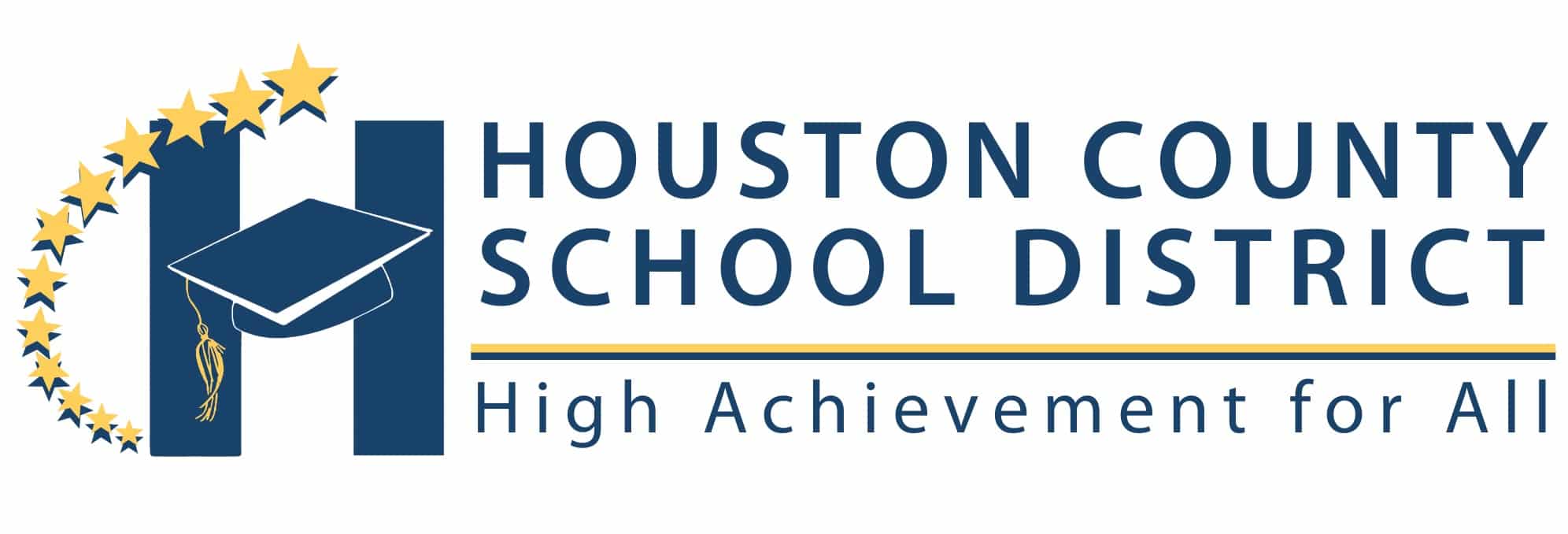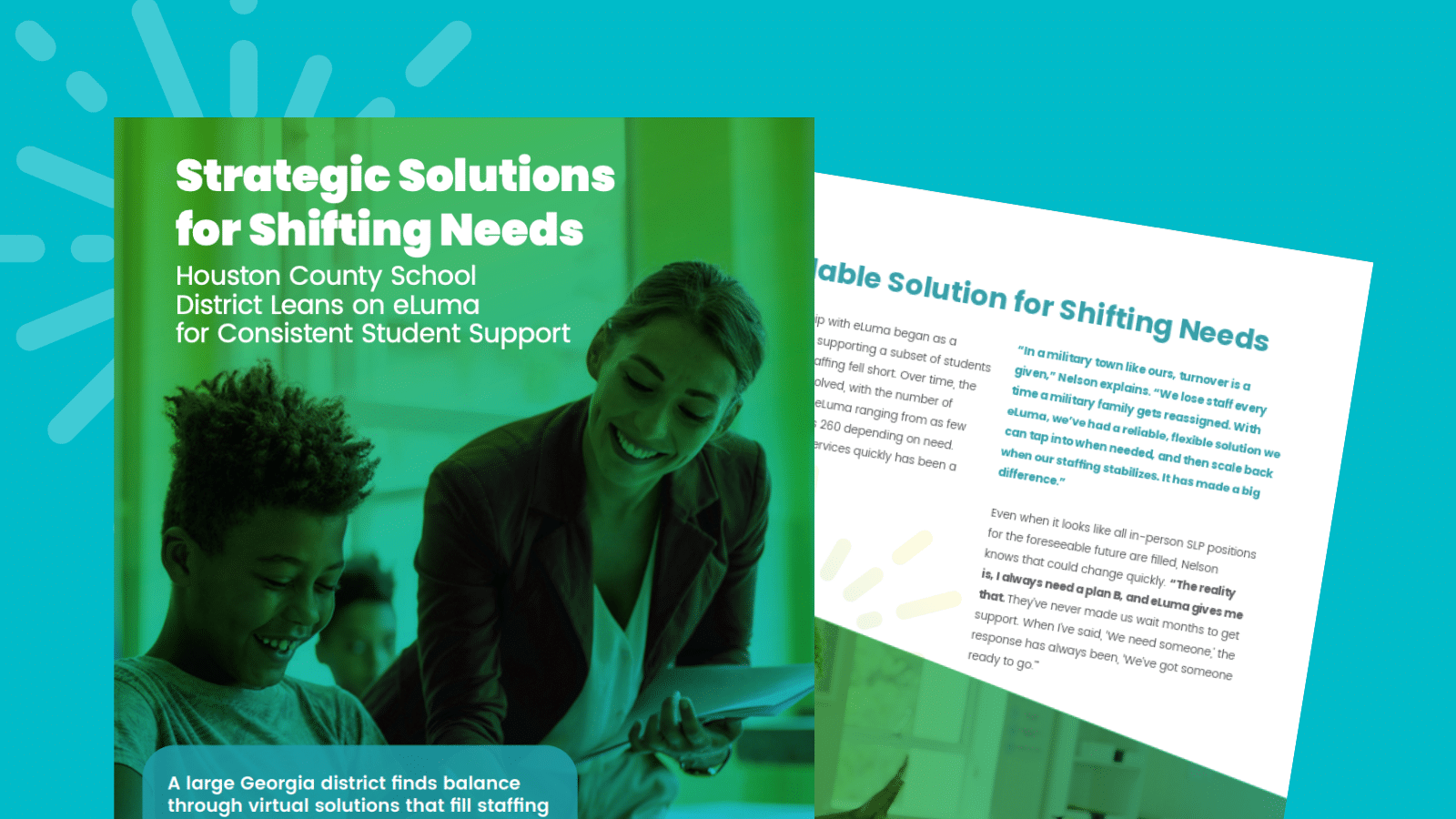Houston County School District:
Strategic Solutions for Shifting Needs
Case Study
Discover how Houston County School District (HCSD) in Georgia uses eLuma’s virtual therapy services to fill staffing gaps, expand access to mental health support, and ensure continuity of care for more than 30,000 students. This case study explores how HCSD adapts to shifting needs while maintaining high-quality, student-centered services.
About Houston County School District (HCSD)
Located in central Georgia, Houston County School District (HCSD) serves more than 30,000 students across 39 schools. Over 42% of students qualify for free or reduced-price meals, and the district’s proximity to Robins Air Force Base means frequent transitions as military families relocate in and out of the area.

Table of Contents
Adapting to Staffing Gaps in a High-Turnover District
HCSD supports approximately 2,000 students with speech needs and maintains 44 speech-language pathology (SLP) positions. But with regular staffing changes due to maternity leave, relocations, and other challenges, the district needed a reliable and flexible partner to help meet every student’s needs.
When in-person staffing falls short, HCSD turns to eLuma. What started as a targeted solution to support a subset of students has become a scalable system that the district can rely on throughout the year. Whether covering maternity leaves or responding to unexpected vacancies, eLuma helps the district avoid service disruptions.
“We’re a big district, and even with 44 in-person SLPs, we still come up short,” says Christa Nelson, Student Services Coordinator for Houston County Board of Education.
“There have been years where I’ve had as many as six people out on maternity leave at once. That’s not something you can plan for easily. eLuma has helped us manage through those situations with minimal disruption.”
As student needs change, eLuma adjusts. At times, the platform has supported as few as 50 students and at others, as many as 260. This flexibility ensures students continue to receive timely, high-quality services no matter what.
“The reality is, I always need a plan B, and eLuma gives me that. They’ve never made us wait months to get support. When I’ve said, ‘We need someone,’ the response has always been, ‘We’ve got someone ready to go.’”
Piloting and Expanding Mental Health Services
In 2023, HCSD launched a small summer pilot using eLuma’s special education counseling services. Based on positive outcomes, the district expanded the program during the school year to reach more students needing targeted behavioral health support.
“There were some early hiccups, but eLuma was incredibly responsive and flexible in adapting providers when needed. Our current therapist has been phenomenal. He communicates well, follows up when students miss sessions, and has really connected with our kids.”
To ensure supervision during virtual sessions, HCSD uses paraprofessionals (known as “eHelpers”) to escort students and remain available as needed. This structure allows for privacy and safety while maintaining consistency and therapeutic rapport.
Building a Culture of Trust and Collaboration
Nelson, a former SLP, knows that collaboration is key to successful therapy whether virtual or in person. HCSD’s lead SLP monitors student progress closely, and eLuma providers participate in IEP meetings, submit documentation, and use the district’s systems to stay aligned with onsite staff.
“eLuma’s documentation tools are solid, and we expect providers to participate in IEP meetings or submit detailed input. That level of integration has helped us keep everyone aligned and focused on student outcomes.”
Parents have also embraced virtual services, especially following the pandemic. While some request in-person services when available, most families find the virtual model effective and accessible.
Feedback from school teams has been largely positive, especially regarding eLuma’s mental health services. Open communication has helped address early concerns and strengthen trust.
“It’s all about the right match,” Nelson says. “We’ve found that middle and high school students are typically well-suited to virtual therapy and very tech savvy. We take extra care with elementary students and those with more significant disabilities, as they often benefit most from in-person support.”
Looking Ahead: Flexibility, Stability, and Growth
To support its mental health services, HCSD used IDEA Part B funding for students with IEPs. This strategic approach expanded access without straining the district’s general budget.
With eLuma, HCSD has been able to maintain service continuity, respond to staffing changes quickly, and help students get the support they need to succeed.
“In-person staff come and go, and that can disrupt services. With eLuma, we have a contract that gives us stability. We know what to expect, and we know they’ll step in when we need them.”
That reliability makes a difference, especially for students who rely on routine and consistency. As the district plans for the future, eLuma remains a trusted partner in helping HCSD evolve with confidence.
“Start with a clear understanding of your needs, and be strategic about how you use services,” Nelson advises other districts. “Not every student will be a good fit for teletherapy, but for many, it works beautifully.”



